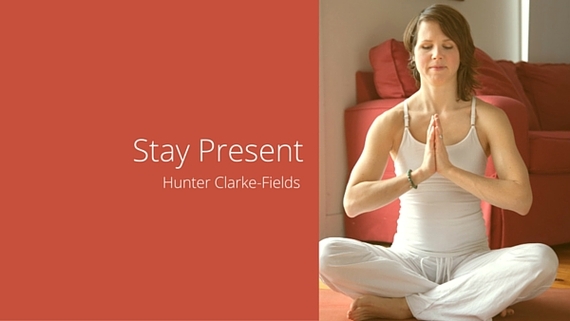My worst moments as a parent look like this: I'm not really there. I'm thinking about something else. I'm texting. I'm distracted.
Or, I'm paying attention...but I don't like it. My child should be acting some other way. I'm mentally resisting what's happening.
When either of these things happens, I can get irritated fast. I'm grouchy and I don't respond so well. I'm willing to bet that it's the same for you.
My best moments as a parent occur like this: I'm clued in, watching my daughter's face, delighting in her experience, or thoughtfully responding to her. We're connected and I'm completely there in that moment with her.
Not only am I completely with her, but there's nothing about now that I'm resisting. I accept her and this moment fully as it is.
What does this look like in real life? Let's take the scenario that my daughter comes home and says she now hates her friend Megan.
- If I am distracted and not listening, she doesn't feel seen and heard and may act out to get my attention. She may feel like "not enough" because I'm showing her that I don't care by not paying attention to her.
- If I resist what is happening in the present moment, not liking what she said, I may say something like, "You shouldn't be unkind to Megan, she's been your friend for so long!" Then my daughter feels like she "shouldn't" have her difficult feelings. What she feels isn't acceptable.
- If I am present and accept the moment as it is, I can hear her out. I listen to what she's saying and the feelings behind what she's saying . She knows from my body language and my gaze that I'm listening. I may say something like, "Oh?' and see what she says. That says to her that I accept her feelings and opens the door for her to talk about her problem.
Our best moments as parents are when we are fully present, with our attention focused on what is happening right now, and we accept what is.
Not only are these moments our best as a parent, but these fully present moments are the best we have as a human being! When we fully accept and pay attention to what is, we're not feeling anxiety (which comes from thinking about the future), regret (which comes from thinking about the past), fear or desire.
Instead? Peace and contentment.
Teachers and sages have taught us to be in the present for thousands of years precisely because, for the most part, we are distracted, in the trance of obsessive thinking.
Ordinary unconsciousness is always linked in some way with denial of the Now. The Now, of course, also implies the here. Are you resisting your here and now? Some people would always rather be somewhere else. Their "here" is never good enough. Through self-observation, find out if that is the case in your life. Wherever you are, be there totally. If you find your here and now intolerable and it makes you unhappy, you have three options: remove yourself from the situation, change it, or accept it totally. If you want to take responsibility for your life, you must choose one of those three options, and you must choose now. Then accept the consequences. No excuses. No negativity. No psychic pollution. Keep your inner space clear.
-Eckharte Tolle, The Power of Now
Our parenting improves when we start to notice our thoughts and observe ourselves. We gain self-understanding. We can see when we are acting out of resistance, or as Eckharte says, "psychic pollution."
Over time we start to make better choices for ourselves and our family. When we release the negativity inside, negativity doesn't come out anymore.
Presence is the quality of being attentive, alert and open. When we respond without resistance, negativity, blame, and judgement to what is happening, we make better choices.
So how do we stay present?
The trick is in practicing to focus our attention. What do you feel right now below your feet? What is the temperature? What sounds do you notice? Bring your attention into your 5 senses rather than getting swept away into the past or future with thinking.
When you are with your child, focus on his or her face, voice and actions. They'll love it! You'll bolster your connection while practicing mindfulness. We will naturally respond with less irritability and more peace.
We can practice this mindfulness, or non-judgmental awareness, simply in our daily life. But we get a lot more bang for our mindfulness buck when we set aside a few minutes each day to practice.
You can learn more about what mindfulness is and practice it in my Virtual Mindfulness Retreat. It's a free service to support busy parents in bringing the benefits of mindfulness into our daily lives.
You can also practice by mono-tasking. That's right, one thing at a time folks! When you are taking a walk, practice to just breathe and walk. When washing the dishes, just wash the dishes. Pick one place each day where you consciously practice mindfulness, that is, focused awareness, on what you are doing.
What do you think?
When are your best (and worst) moments as a parent? Start the conversation in the comments below!
